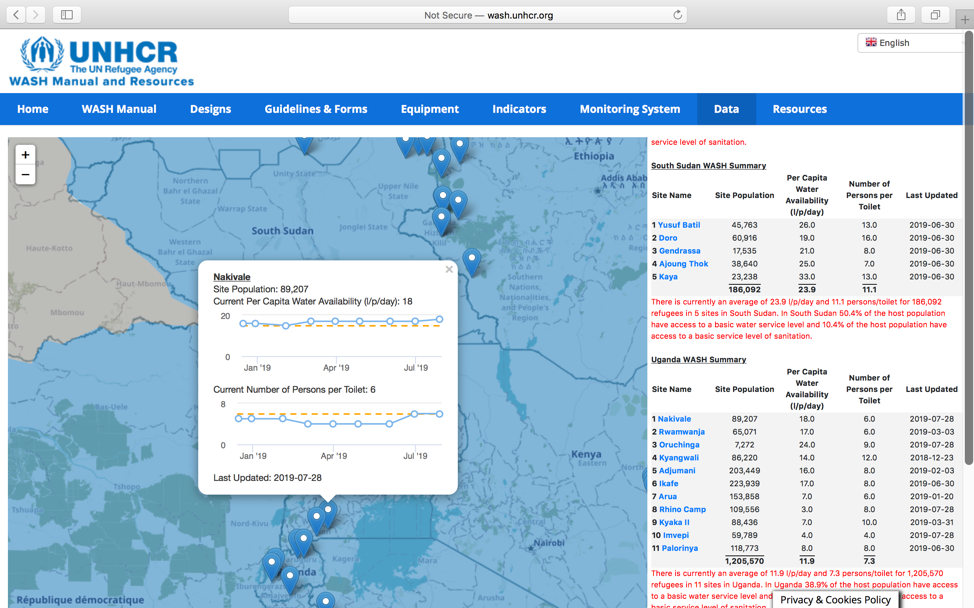“One Stop Shop” for WASH info for refugees and IDPs
Challenge presented by UNHCR
Background
At the 2018 Emergency Data Science Workshop, the Office of the United Nations High Commission for Refugees (UNHCR) presented a challenge to develop a WASH Data Portal that would be a “one stop shop” for information about WASH service access for refugees and IDPs. This portal would be used to:
- Identify people groups and geographical areas where WASH service access falls below minimum standards, or is lagging behind sustainable development goals (SDG) development processes, which provides a basis of advocacy for more resources to support improved WASH access in these areas/people groups.
- Monitor progress and improvements/decline in access to WASH services over time, and therefore inform WASH programming and budget decisions.
- Facilitate comparative analysis between WASH service provision to refugees/IDPs and host communities, to ensure refugees are not left behind in SDG development processes.
During the workshop, UNHCR and REACH, who faced a similar WASH data-related challenge in South Sudan, jointly explored developing a WASH data portal with a number of specialists from computer science, information management, ethics and governance, and designers. The working group consisted of representatives from the American Red Cross, George Washington University, National Research Council of Canada, Université de Sherbrooke, UNHCR, REACH, Quoin Inc., University of California Irvine, and York University. The working group brought a design thinking approach to the problem, mapping out goals and anti-goals, understanding potential users better, and figuring out what the minimum viable product (MVP) would be able to support operational decision-making.
"The Emergency Data Science Workshop was incredibly useful for the UNHCR Water and Sanitation Team. The EDS Workshop provided a networking opportunity to meet experts in Data Science and understand the full stack web technologies required to develop the data portal. Working through our particular challenge in detail helped us understand our clients (the main users of the data portal), what real-time and historical information they needed to make decisions, and where we should invest our time and energy. The session gave us a viable methodology for incrementally developing the WASH Data Portal and gave us the confidence that it was a challenge we could overcome."
Ben Harvey, UNHCR WASH Team
Progress
- Since the workshop, UNCHR took an incremental approach to building out an MVP for the WASH data portal, beginning with just two key indicators (per capita water availability and number of persons per toilet) for one country. The MVP demonstrated that live data updated by UNHCR Country Programs could be pulled in a visualized in a geographic information system interface on the web.
- UNHCR has now expanded the MVP to cover all UNHCR project sites globally. The UNHCR WASH Dashboard for Refugee Settings is live and can be accessed here: http://wash.unhcr.org/wash-dashboard-for-refugee-settings/
- UNHCR Country Teams are already utilizing the WASH Dashboard to gain quick overview of WASH service levels across all sites in country.
- Next steps for the WASH Dashboard include: 1) Adding in secondary WASH service indicators; 2) integrating Joint Monitoring Programme (JMP) indicators in order to facilitate comparison of refugee/IDP and national coverage figures; 3) integrating other datasets from within UNHCR as well as others; and 4) adding functionality to enable users to download the raw datasets.

Learn More
Full Challenge Statement
Challenge Presentation here.
Working Group Solution Pres here.